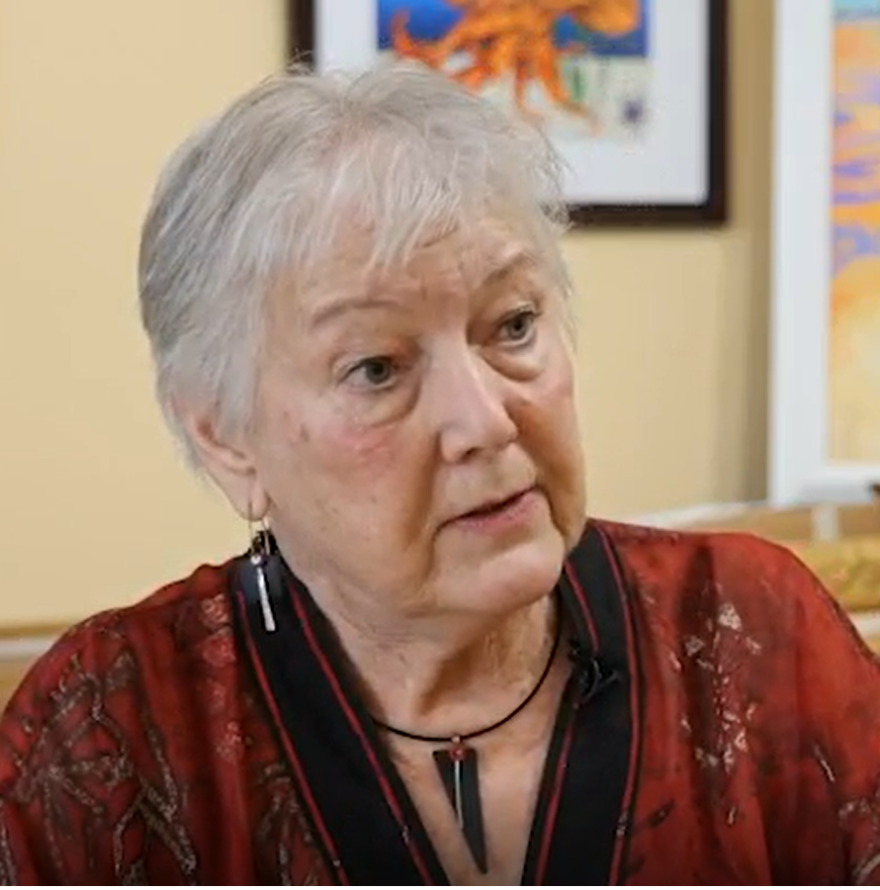When you think of the U.S. industries most impacted by tariffs imposed under the Trump administration, automotive, electronics and construction may be top of mind as sectors dependent on imported materials. However, tariffs are also making it difficult for textile artists to make a living.
Textile art, or fiber art is rooted in traditional crafts and domestic arts, but over the years, it’s garnered broader recognition as a legitimate form of contemporary art.
One recent example of this is the South Florida Surface Design Association’s “Uncommon Threads” exhibition now on display at the Court House Cultural Center Gallery in Stuart. It’s an international juried show of 70 works including wearable pieces, stitched fabric works, collage and mixed media.
Fiber artist and educator Suzanne Conners has a piece in the exhibit. She’s also maintained the Aya Fiber Studio in Stuart for the past 12 years, and said the Trump administration’s tariff war is impacting her bottom line.

“Because I do Japanese textiles, I import a lot of my tools and supplies from Japan, and I also buy a lot of fabrics from India and from different countries. Even my natural dyes come from the UK,” said Conners.
“And I always had to pay some sort of tariffs. You were always allowed, up to your first $800 to be totally exempt from paying tariffs. Now we're paying tariffs on everything. India's tariffs right now are 50%. So, on a $3,600 order, there's going to be $1,800 in tariffs on top of the shipping.”
Many of the overseas supplies Conners and other fiber artists use are specialty items that aren’t available domestically, like silk from China. “We don't harvest silkworms here. That's not a U.S. industry. Even the products that you do buy in the U.S. are…already substantially more money than the products we import.”
Conners said even her overseas suppliers are worried about business due to the tariff war. “The guy who weaves my silk scarves from India, for me; he's a small family-run mill, and he said all his orders right now are on hold. He's had to let people go. He doesn't know, if he gets any orders, how long it will take,” said Conners.
U.S. Customs has been a challenge for fellow fiber artist Cindy Bartosek, who curated the “Uncommon Threads” exhibition. She specializes in photography, eco-friendly printing, and tapestry weaving. “I did order, without thinking, ordered some watercolors because I'm using that with some of the photography things, and I didn't really think about it being from a Canadian company,” said Bartosek. “I didn't have to pay extra duty, but my watercolors spent six days trapped in U.S. Customs.”

Customs delays also impacted the exhibit itself. An artist in the Netherlands, who was selected from more than 90 applicants to have their pieces in the exhibit, was too afraid to send her work.
“FedEx, DHL, postal companies, suspended shipments to the U.S., and it’s supposed to be temporary. She was afraid to go ahead and ship it, not having any idea when it might actually get here. So, she ended up not sending her work, which was a real loss for us, because her work is absolutely fabulous,” said Bartosek.
Instead, she decided to hand poster-sized photographs of the artist’s work in the show.
Bartosek also echoed Conners’ concerns about foreign suppliers being able to hold on.
“The watercolors I was talking about that I ordered from Canada; they're produced by an indigenous family and small business. What's going to happen to them if shipping and the tariffs become such a barrier that their business no longer becomes sustainable?” asked Bartosek. “Particularly in the art world, there are a lot of small businesses, family owned or tiny things. I fear that some of them aren't going to survive this.”
Naples-based artist Muffy Clark Gill also has some collage and mixed media pieces in the “Uncommon Threads” exhibition. She works in an ancient wax and dye resist process called batik, and much of her work reflects a fusion of African, Indonesian, and Japanese techniques.

Gill got proactive when Trump first began threatening tariffs. “I saw it coming, so I started stockpiling silk,” said Gill. “You know, I'd buy like 10 yards at a time. Most of my pieces take about a yard of silk and I reuse every bit of it. I don’t waste it. If it’s dyed and I have scraps, I make them into other pieces of artwork.”
Trump’s trade policies with Japan have been marked by fluctuating tariffs going back to his first term. Even with a bilateral trade deal finalized in September resulting in a 15 percent reciprocal tariff on most Japanese imports, Gill is holding out for now.
“I haven't ordered anything since the tariffs from Japan, and I need to order more brushes. So, it'll be interesting to see whether… the store owner actually passes on the tariff to me or not.”
Gill worries for artist communities beyond the tariff challenges.
The National Endowment for the Arts has faced sweeping cuts this year amid Trump’s calls to eliminate the agency. Florida state funding for the nonprofit arts and culture sector has also been gutted the past two years. Even murals on public roadways are being painted over under Florida law.
“Things that are going on right now in the art world; that people being shut down and public expression being stifled by painting over sidewalks. You know, it just boggles the mind,” said Gill.
“All of a sudden; Why are people having a problem of understanding art when it's such a help to people? You know, art is… it keeps people alive. And, you know, I just worry about that.”
WGCU is your trusted source for news and information in Southwest Florida. We are a nonprofit public service, and your support is more critical than ever. Keep public media strong and donate now. Thank you.





